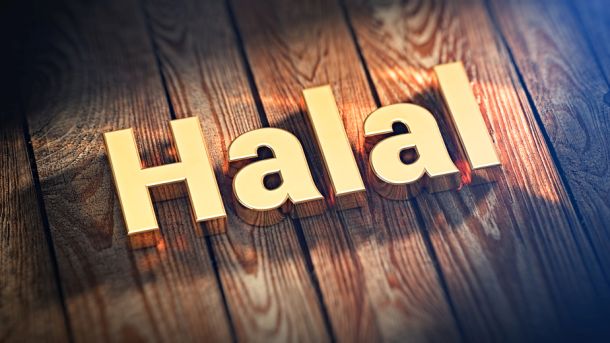Halal is a booming global business
The essence of Halal is in its divine generosity: Allah the Creator, in answer to a direct question regarding what is allowed for human consumption, said: ‘All good things have been made lawful for you’ (Qur’an, C5v4). Naturally, what is good does no harm. Viewed as a concept, Halal is a remedy to keep from […]

The word “Halal” is lined with gold letters on wooden planks. 3D illustration picture
The essence of Halal is in its divine generosity: Allah the Creator, in answer to a direct question regarding what is allowed for human consumption, said: ‘All good things have been made lawful for you’ (Qur’an, C5v4).
Naturally, what is good does no harm. Viewed as a concept, Halal is a remedy to keep from harm. Halal is an advantage. It is, also, a guarantee for utility, safety and wellbeing. No one who recognizes the concept of Halal can fail to understand why the Halal ecosystem invests so much scrutiny to eliminate unhealthy ingredients from Halal products.
The Global Halal Economy is recording remarkable growth. It is expected to grow 20 per cent annually, according to Global Islamic Report 2022. Global sales of Halal for both 2020 and 2021, were at all time high, recording $2 trillion each. These were two years in which the business world was burdened by COVID-19. In addition, the Global Halal market is without borders; it sells and buys globally without regard to faith or territorial boundaries. Therefore, I encourage our manufacturers, farmers, suppliers, entrepreneurs, and banks to invest in Halal.
Halal foods are gaining popularity among Muslims and non-Muslims alike. This is because in our information driven world, we are guided, in part, by ideas that we see on our social platforms, and, as a result, we do many things without regard to religious considerations; we do many things because they fit our lifestyle or perceived social or health benefits. Besides, Halal foods, wherever encountered, symbolize cleanliness, richness, integrity, and safety.
International conglomerates such as Nestle, Unilever, Cargill are at the forefront of Halal enterprise. In fact, European and American conglomerates represent seven out of the ten largest players in the global Halal market. Global fast food chains McDonalds, KFC and Subway are not only serving Halal in Muslim countries, they are also offering Halal menus in some non-Muslim countries. In effect, Halal is no longer viewed as a prescription for Muslims but as a profitable business across the world and as a brand for all who care about product quality, health, fair trade, animal welfare, and the environment.
Sustainable infrastructure improvements and development are what we require to support Halal industry growth and profitability for our businesses. Sustainable processes are critical not only in the narrow scope of our local operating environment, but also from the perspective of the global Halal market.
How do we take off as an industry? How do we explore comparative advantage? How do we identify and implement sustainable methods for Halal production? How do we regulate? How do we acquire credibility for Nigeria Halal certified products? And, generally, how do we put in place a support system essential for continuing success in the market for Halal, both here at home and around the world? These are some of the issues we must address in order to build a sustainable and profitable Halal industry in Nigeria.
Presently, the National Technical Committee on Halal, set up by the Federal Ministry of Industry, Trade and Investment, is working to prepare a roadmap for Halal development as well as a framework for Halal operations in our country. As Chairman of the Committee, I invite Halal professionals, food manufacturers, suppliers, entrepreneurs, investors, bankers, and the media to participate in support our common mission ‘to make Nigeria a reliable provider of Halal goods and services to the world with focus on product integrity and greater value for our customers’.
Nour Sani Hanga, Chairman National Technical Committee On Halal Development
